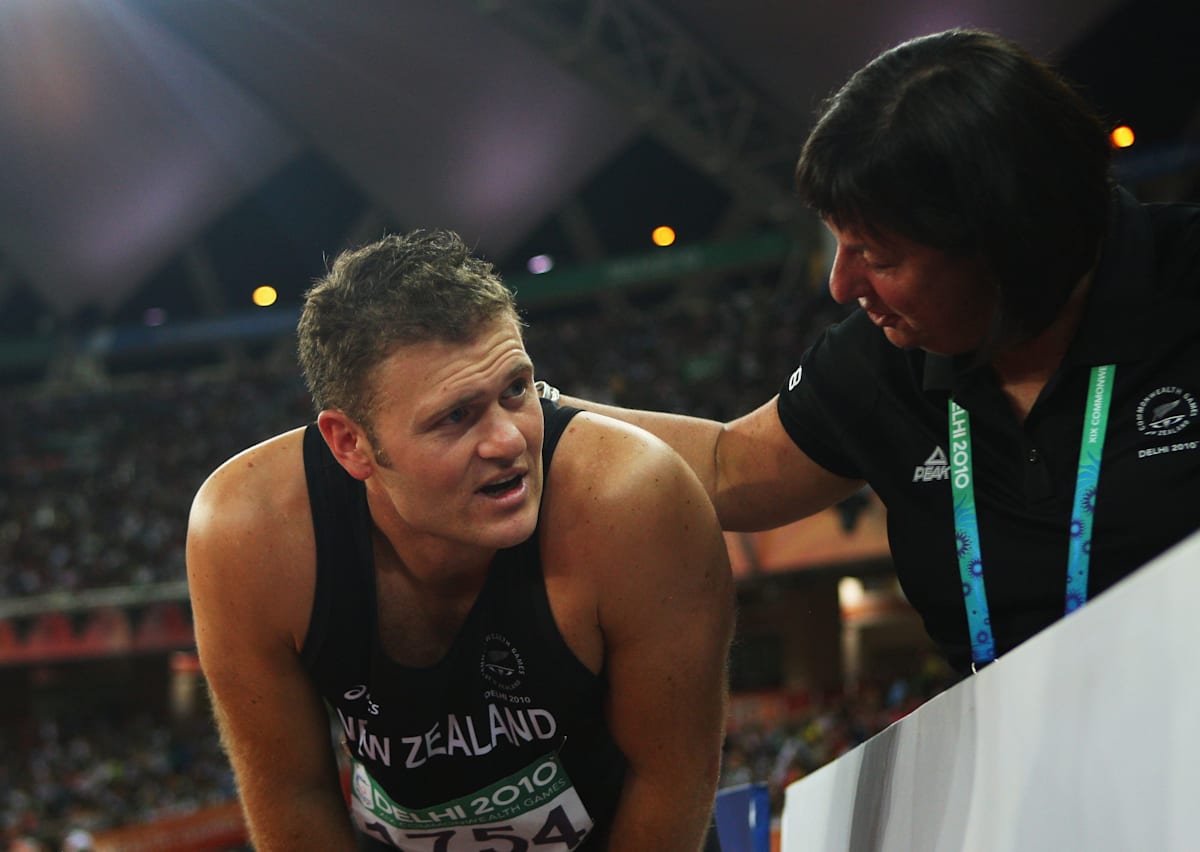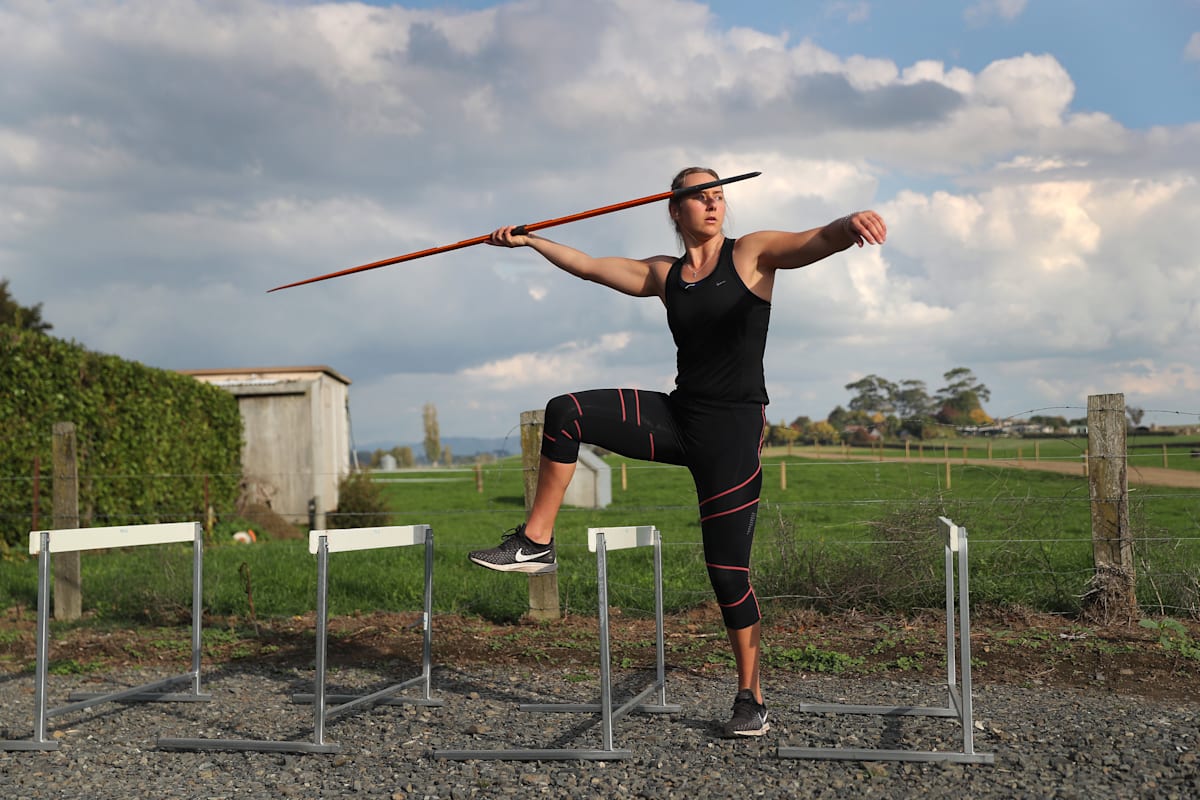
Debbie Strange has coached some of NZ's top throwing athletes to greatness over the last four decades, and now she's sharing her skills around the globe, Merryn Anderson discovers.
When Tori Peeters fired her javelin to a new record distance at the Capital Classic a fortnight ago, the first person she looked for her was her coach, Debbie Strange.
The pair have been through a lot together over the last four years, including Peeters’ shock omission from the Tokyo Olympics. Their focus is now to get Peeters to the world championships in July and the Commonwealth Games in August, and the 60.15m New Zealand residents record she threw in Wellington has her well on the road to Oregon and Birmingham.
“I love it when I have a good throw and Debbie’s actually there to see it; that’s one of the main things that makes my day,” Peeters says. “I love when we've put in all that practice and I can get a good result out of it for her to see.”
Strange has been a leading throws coach for four decades, and her work is recognised around the world. The Hamilton-based coach is also doing as much as she can to grow athletics coaches in Oceania, and she helped coaches worldwide to continue their jobs during a lockdown.
The rise of athletics in New Zealand has made a lot of throwers household names - Dame Valerie Adams, Julia Ratcliffe, Lauren Bruce and Beatrice Faumuina all excelling in their chosen disciplines.
However, you’d have to be an active follower of these sports to know the names of the people who helped get them to Commonwealth and Olympic heights.
Strange has an impressive track record. She coached four-time Olympian Stuart Farquhar - the Waikato javelin thrower winning silver at the 2010 Commonwealth Games and clinching a top 10 finish at the 2012 London Olympics.
Another Kiwi athletics legend reached new heights with Strange: discus thrower Faumuina won gold at the 2002 Commonwealth Games and achieved her best ever finish (sixth) at the 2004 Athens Olympics while being coached by her.

Despite her amazing resume, Strange is still open to listening to her athletes and trying new things. It’s one of Peeters’ favourite qualities about her coach.
“I think it’s quite common, often as a young athlete coming up the ranks, the coaches tell you what to do so you just do it,” Peeters says.
“There’s a level of input as an athlete you need to be able to have and feed back to your coach. Because they can keep telling you something, but if you’re not actually understanding it, you’re gonna go nowhere.”
Strange’s technical knowledge of javelin is an essential part of her coaching technique, but Peeters points out her progress comes from a group effort.
“Deb is really open to hearing how I’m feeling the javelin in all the positions," Peeters says. "We couple that with her language and we sort of meet in the middle to find that happy medium, which I think is really helpful.”
It’s easy to see why Strange and Peeters are such a good match - their bubbly, friendly personalities and openness complement each other perfectly.
Peeters will be looking to Strange again on Sunday as she competes in the Sir Graeme Douglas International meet in Auckland, aiming to be on track to qualify for the world championships in Oregon and then tick off the A qualifier for the Commonwealth Games, which is 61.50m.
“Things are going well for her at the moment,” Strange says. “As long as she continues to be fit, be healthy and just keep calm and relaxed, which she’s doing a really good job of this year, it’ll happen.”
Strange also encourages her younger javelin throwers to pursue other athletics disciplines and even other sports, to create well-rounded athletes. Peeters was also threw shot put in her early years.
“I like them to be doing other events like sprints and relays and a bit of shot put, discus and hammer too, just for fun, which is really important,” explains Strange, who also wants them to be well set up in their studies.
“Rugby always wants javelin throwers because they’re such tremendous athletes. A javelin throw is a run, jump and a throw, all packed into one action - they really are tremendous athletes which is really great for being in the forwards.”

While our Kiwi athletes were hard at work in their home gyms and backyards during the pandemic lockdowns of 2020 and '21, Debbie Strange was making sure their coaches were on top of their game too.
Because it's not only the athletes Strange supports. “I’m really quite passionate about coach development and coach education,” she says.
During lockdown, Strange and a team of 12 (Strange the only woman on the team) got to work editing the World Athletics coach education certification system, and putting the material online so coaches worldwide could access them during the pandemic.
“It’s been really tricky to try and cater for the different environments people are working in,” she says.
“You can imagine how the Europeans operate is completely different to the huge geographical challenges that we have in Oceania. People making connections electronically and being supported in their coaching environments has been a really cool challenge.”
Strange is part of a group working to establish a voice for coaches in Oceania, to connect them to the rest of the world.
“It’s for coaches by coaches, and an independent body that's supportive of coaches and giving them a voice,” she says. “Very often the coach’s voice gets controlled by their federation or not heard at all. So we don’t really know what coaches need around the islands because no one has really asked them.
“I’ve been coaching a very long time and I don’t want to see coaches of any level put down or be controlled by people holding finances or having the pressure put on them to produce gold, silver and bronze. Or being pushed to work in an area they’re not comfortable in.
“To be in a position to help and mentor them in some way in their own personal growth and development as a coach I think is really important.”
Strange’s work was recognised in 2020 when she was recipient of the Arthur Eustace Award for Coaching, recognising coaching excellence in New Zealand athletics. She's only the second person to receive the honour.
The late Eustace’s wife, Anne Bennett-Eustace, gave a fitting tribute to Strange’s work. “Debbie has coached at the highest level, having produced Olympic finalists, yet is still willing to work with beginner and developing athletes,” she said.
Strange believes the New Zealand athletics scene is very well-balanced, with high participating numbers of women and para athletes around the country.
But there are other places in Oceania that aren’t as lucky, and what Strange hopes to change.
“Right round Oceania, there are some fantastic women coaches who, when it comes to the crunch, don’t get to travel with the team. So we don’t ever see them and that’s really sad,” she says.
Last week, a Kiwi parent approached to Strange to say that her daughter was inspired to compete after participating in the ‘Throw Like a Girl’ event Strange helped run in 2020.
“For young athletes coming into a sport, they need to see a pathway. And I think our pathways in Athletics New Zealand need to develop more and be a lot stronger, not only for the athletes but also coaches,” she says.
“Coaches need to see a pathway for themselves, to whatever level and area they're happy in and enjoy coaching in.
“Not everyone wants to be a high performance coach. It’s tough, it’s not easy and a lot of coaches really enjoy working with the development end, at club level. I think if that’s what they enjoy, they’re going to perform the best at that level and they should be encouraged and supported to do just that.”
* Because of Covid restrictions, there will be no spectators at the Sir Graeme Douglas International on Sunday. But you can watch the action on Sky Sport 9, or free-to-air with Sky Sport Now, by registering before 3.30pm at www.skysportnow.co.nz.







